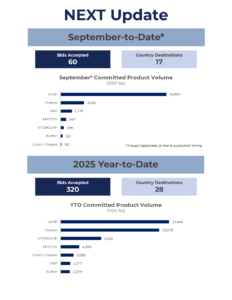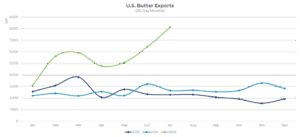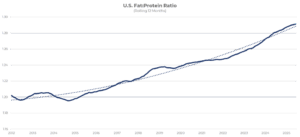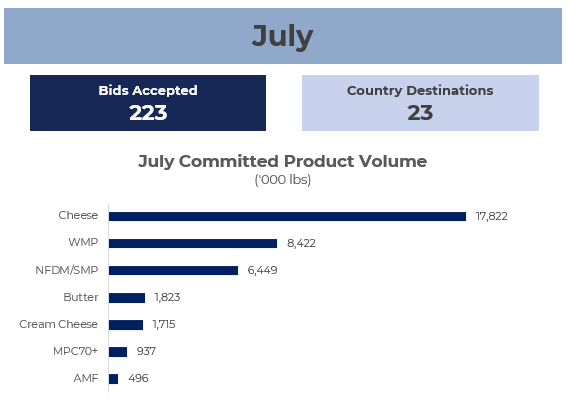NMPF’s Executive Vice President of Trade Policy and Global Affairs Shawna Morris said the federation is thrilled with the announcement from the Trump administration of new trade agreements in Southeast Asia. The agreements were with Malaysia and Cambodia, and new trade agreement frameworks are in place with Thailand and Vietnam.
Tag: dairy exports
NMPF Identifies Dairy Trade Barriers for U.S. Government
NMPF and USDEC filed extensive comments Oct. 30 as part of the U.S. Trade Representative’s (USTR) request for global trade barriers for its 2026 National Trade Estimate report.
The list of issues compiled by NMPF and USDEC highlight dairy trade irritants in 34 different markets, including regional blocs like the European Union and parties to the Central America-Dominican Republic Free Trade Agreement.
Several key issues that the organizations cite include Canada’s refusal to comply with its dairy commitments under USMCA, dairy facility registration challenges across various markets, and the European Union’s long list of trade-distorting measures ranging from certification requirements to the abuse of geographical indications to monopolize common names like “parmesan.”
Supplementing NMPF’s engagement with USTR as cleared confidential advisors, the comments serve as a key resource for the U.S. government as it engages in negotiations with trading partners. The 2025 National Trade Estimate report has served as a guide for crafting the Trump Administration’s reciprocal trade plan. It also offers details on priority dairy markets and products as the U.S. government seeks to resolve barriers to dairy trade and expand market access opportunities.
NEXT-Assisted Export Sales Near 24 Million Pounds as September Winds Down
NEXT member cooperatives secured 60 contracts in September, with one week still outstanding for the month; full-month data will be available later this week. These contracts added 23.9 million pounds of product in NEXT-assisted sales in 2025. These products will go to customers in Asia, Oceania, Middle East-North Africa, Central America, the Caribbean and South America and will be shipped from September 2025 through May 2026.
Exporting dairy products is critical to the viability of dairy farmers and their cooperatives across the country. Whether or not a cooperative is actively engaged in exporting, moving products into world markets is essential. NEXT provides a means to move domestic dairy products to overseas markets by helping to overcome U.S. dairy’s trade disadvantages.
The referenced amounts of dairy products reflect current contracts for delivery, not completed export volumes. NEXT will pay export assistance to bidders only when export and delivery of product is verified by submission of required documentation.

U.S.-Taiwan Dairy Partnership Advances Shared Growth
The National Milk Producers Federation, U.S. Dairy Export Council and the Dairy Association of Taiwan signed a memorandum of understanding (MOU) today in a milestone step to strengthen the relationship between the U.S. and Taiwanese dairy sectors.
The MOU underscores the importance of facilitating trade, defending the image of dairy, supporting dairy farming, and deepening cooperation between the U.S. and Taiwan on dairy benefits and trade.
Together, the organizations will explore opportunities to strengthen commercial ties, encourage dialogue between both dairy sectors, including producers, industry leaders and policymakers, and promote the role of dairy in supporting healthy diets.
“The partnership is an important development for U.S. dairy producers,” said Gregg Doud, president and CEO of NMPF. “Taiwan is a growing market, and this agreement ensures that U.S. dairy is well-positioned to meet demand for high-quality dairy products in the region. The memorandum reflects our industry’s efforts deliver real value back to the U.S. dairy community through exports.”
“This agreement is a significant step toward expanding the presence of U.S. dairy in Taiwan, one of the most dynamic markets in Asia,” said Krysta Harden, president and CEO of USDEC. “By strengthening ties between our dairy sectors, we are creating new avenues for growth and innovation. Together, we will highlight the strengths of dairy while building long-term opportunities that benefit both Taiwanese and American consumers and producers.”
Signed during a USDA-led trade mission to Taipei, the agreement builds on NMPF and USDEC’s network of allies around the world that helps advance a sustainable and prosperous future for the industry.
Butter exports shift in our favor
 By Will Loux, Senior Vice President, Global Economic Affairs
By Will Loux, Senior Vice President, Global Economic Affairs
In an article earlier this year, I asked the question whether the U.S. could export its way out of the glut of cream that had filled the market. I posited that while it would take a while for U.S. exports to start growing in earnest due to the high cost of entry for first-time exporters, the market signals were such that the U.S. would inevitably need to sell more butterfat overseas.
As evidenced by June and July’s export data, that flow of butterfat to international markets has arrived in earnest. June was the U.S.’ largest month of butter exports since 2014, only to be bested just one month later. The U.S. even managed to sell over 2,000 metric tons (MT) of butter to the European Union in July, overcoming a normally cost-prohibitive tariff of 50 cents per pound. The U.S. is also exporting greater volumes of anhydrous milkfat than ever before. In fact, combined exports of butter and anhydrous milkfat (AMF) have grown by more than any other dairy product so far this year on a component-adjusted basis.

The question today is no longer whether the U.S. will export butterfat but rather how much, and can the U.S. become a consistent exporter moving forward?
From a short-term perspective, the path seems clear for the U.S. to sell more butterfat overseas. The U.S. remains highly competitive on price today despite European and New Zealand prices falling. Just as importantly, the U.S. still has plenty of supply available for export despite the surge in exports and solid domestic sales of butter. Simply, the exponential growth in U.S. milkfat tests combined with U.S. dairy herds in expansion mode means the U.S. should have allocation available at an affordable price for international customers for the foreseeable future. While making export spec butter is usually a special run for American manufacturers, U.S. exporters and international buyers are undoubtedly working to get U.S. butterfat products in variety of overseas markets.

Even from a longer-term perspective, there are plenty of reasons to suggest the U.S. could be undergoing a paradigm shift in favor of greater export business for butter and AMF. The fat-to-protein ratio in milk continues to rise, meaning U.S. cheese manufacturers are now faced with more milkfat than required for cheesemaking. Additionally, the rise in ultra-filtered and protein-fortified beverages will also result more cream moving onto the market. Finally, and just as importantly, the recovery in global demand means international buyers are looking for suppliers besides New Zealand and Europe, the latter of whom have been retreating from commodity fat markets within the last several years.
The investment and strategic foresight to position the U.S. as a consistent player in global butterfat markets, will take plenty of time. However, it wouldn’t be the first time the U.S. dairy industry has identified an opportunity, embraced the challenge, and emerged stronger and more resilient for it.
This column originally appeared in Hoard’s Dairyman Intel on Sept. 15, 2025.
NMPF Leads Charge in Dynamic Trade Environment
- Advocated for dairy priorities in administration’s Reciprocal Trade Deals
- Secured the reintroduction and advancement of key common names bill
- Spurred federal investigation into global nonfat milk solids marketplace
- Expanded network of allied organizations
- Advanced key supply chain initiatives
NMPF has actively navigated the new administration’s proactive and unconventional trade approach to forge better global prospects for U.S. dairy exporters.
As the Trump administration’s trade negotiations unfold, NMPF Executive Vice Presidents Jaime Castaneda and Shawna Morris are serving as confidential private sector advisers to the U.S. Trade Representative and U.S. Department of Agriculture, offering guidance to ensure that U.S. dairy interests are represented and pursued across the globe.
To date, the United States announced trade frameworks with key dairy trading partners including South Korea, the European Union, the United Kingdom, Japan, Vietnam, the Philippines, and Indonesia. These frameworks vary in scope and detail and are designed to set the stage for more detailed negotiations to follow soon.
The frameworks with Indonesia, Vietnam and the Philippines are particularly promising for dairy exporters. It appears likely that all three countries will zero out tariffs on U.S. dairy exports, leveling the playing field with New Zealand and Australia, and in some cases the European Union too. Indonesia’s framework also addresses longstanding barriers that have made it difficult for American companies to compete in the market. This includes dairy facility registration approval improvements and steps that would help protect common name rights in Indonesia for products like “parmesan” and “feta.” Details on all announced trade details are forthcoming.
In addition to providing guidance as cleared advisors, NMPF worked hard in the months leading up to the negotiations to lay the groundwork for success. As the administration began to fill out its cabinet and agency positions, NMPF and the U.S. Dairy Export Council (USDEC) shared trade priorities with incoming USTR and USDA officials to improve the global competitive landscape for U.S. dairy exporters. NMPF President and CEO Gregg Doud testified before the House Ways & Means Trade Subcommittee, where he called for the U.S. government to pursue greater market access for U.S. products and enforce existing trade agreements.
Throughout its meetings and engagements with the Trump Administration, NMPF has stressed the need to preserve trade flows, while encouraging a tailored approach to tariffs that ensure fairness for U.S. farmers and workers.
NMPF remained active in multiple trade-related areas that went beyond negotiations, for example supporting the Apr. 1 reintroduction of the Safeguarding American Food and Export Trade Yields (SAFETY) Act and continuing additional efforts to proactively protect common food names for American cheesemakers. Originally introduced as the Safeguarding American Value-Added Exports (SAVE) Act in 2023, the SAFETY Act would direct the U.S. Department of Agriculture and U.S. Trade Representative to prioritize the protection of common names like “parmesan” in international trade negotiations.
As Congress and the administration prepare for next year’s critical U.S.-Mexico-Canada Agreement (USMCA) review process, NMPF is engaging with and supporting the U.S. Trade Representative’s office and other key stakeholders to ensure that they have the information needed to strengthen the agreement for U.S. dairy producers and exporters.
A particular issue that needs addressing is Canada’s dairy policies that incentivize dairy protein to be produced, then offloaded globally at artificially low prices — including by shifting tariff codes to evade USMCA export surcharges.
NMPF responded to this issue by pressuring the administration to address Canada’s persistent flouting of USMCA commitments, which led to a U.S. International Trade Commission (USITC) investigation launched May 20 into the export competitiveness of nonfat milk solids industries in the United States and other major suppliers. NMPF submitted written comments as part of that investigation outlining underhanded practices by Canada and other global suppliers that harm U.S. producers. NMPF’s Jaime Castaneda and Will Loux further elaborated on those points at a July 28 USITC hearing in the case.
NMPF has expanded its network of international allies, strengthening its ability to advocate for U.S. dairy worldwide. During a March 17-20 trip to Central America, Castaneda closed a memorandum of understanding (MOU) between NMPF, USDEC, and the Guatemalan Dairy Development Association (ASODEL). The agreement strengthens ties between the U.S. and Guatemalan dairy industries as they advocate for free and fair-trade policies and promote greater dairy consumption.
NMPF and USDEC signed an MOU May 1 with KADIN, the Indonesian Chamber of Commerce, strengthening ties between the U.S. and Indonesian dairy industries. This agreement builds on a flourishing partnership between the two countries, launched by the establishment of the U.S.-Indonesia Dairy Partnership Program. This collaboration is focused on creating and distributing technical educational materials designed to empower small-scale dairy producers in Indonesia to improve the quality and quantity of their milk production while touting the value of complementary U.S. dairy imports to meet the full needs of Indonesia’s expanding school milk program.
To ensure that U.S. dairy exporters can depend on timely and reliable shipping and rail transportation, NMPF is prioritizing supply chain improvements.
USTR on Feb. 21 proposed to impose fees on Chinese-built and -operated cargo ships as part of a larger investigation into Chinese maritime dominance. While this action was well-intentioned, NMPF and USDEC filed comments on March 24 to warn the agency that additional service fees would significantly increase costs for American exporters and diminish shipping options for U.S. products — both of which could lead to loss of global market access. USTR heard the industry pushback and modified the rule on June 12 rolled back the severity of the proposed fees. NMPF continues to urge the agency to re-evaluate the remaining fees to ensure U.S. dairy exporters do not face additional costs to export.
NMPF Dairy Experts Testify on Milk Solids Before ITC; Staff Present on Economy, AI
NMPF’s Jaime Castaneda and Will Loux testified on July 28 before the U.S. International Trade Commission (USITC) as part of the agency’s ongoing Section 332 investigation into the United States’ nonfat milk solids competitiveness relative to other global suppliers, highlighting another busy month for NMPF staff in outreach and policy influence.
Testimony by Castaneda, NMPF’s executive vice president for Policy Development and Strategy, and Loux, who heads NMPF’s Joint Economics Team with the U.S. Dairy Export Council, complemented nearly 60 pages of comments filed July 16 that focused on Canada and other global suppliers’ persistent efforts to offload structural surpluses of nonfat milk solids onto the global market at artificially low prices.
NMPF and USDEC requested that the U.S. government address Canada’s attempts to circumvent its dairy obligations in the U.S.-Mexico-Canada Agreement. Despite Canada’s USMCA commitment to reform distortionary pricing schemes, limit the offloading of low-priced dairy proteins and expand its market access for U.S. dairy exporters, it has failed to follow through in meaningful ways on all three fronts undercutting U.S. dairy producers both at home and abroad — a point drawn out in the two testimonies. In response, USTR requested that the USITC conduct this investigation.
The USITC’s findings, due next March, will inform the U.S. government’s strategy heading into the upcoming USMCA review between Canada, Mexico and the United States.
NMPF and USDEC also highlighted other global suppliers that benefit from a combination of direct subsidies and state trading enterprises that distort global trade, including product originating from India, Turkey and the European Union.
The Loux and Castaneda presentations were among several spotlighting dairy’s leadership in July. NMPF Senior Director for Economic Research & Analysis Stephen Cain gave a tariff and trade outlook to industry professional on June 26 at the HighGround Global Dairy Outlook Conference in Chicago. Cain also presented a global dairy outlook to the Wisconsin Dairy Products Association Dairy Symposium in Lake Geneva on July 15 and gave a market outlook to WI Farm Bureau and the Dairy Farmers of WI in Madison later in the month.
Meanwhile, NMPF Executive Vice President for Communications & Industry Relations Alan Bjerga presented on Artificial Intelligence and the challenges of communicating dairy’s messages in an evolving information environment at the Agricultural Media Summit in Rogers, AR, on July 29.
July NEXT-Assisted Export Sales Reach Nearly 38 Million Pounds
NEXT member cooperatives secured 223 contracts in the program’s first month, totaling 37.7 million pounds of product in NEXT-assisted sales in 2025. These products will go to customers in Asia, Oceania, Middle East-North Africa, Central America, the Caribbean and South America and will be shipped from July through December 2025.
NEXT (NMPF Export and Trade) gained final approval from NMPF’s Board of Directors at its June meeting. It succeeds the previous Cooperatives Working Together (CWT) program, expanding its service to dairy producers and testing innovative new ways to build U.S. dairy’s global market share. NEXT provides an effective means to move domestic dairy products to overseas markets by helping to overcome U.S. dairy’s trade disadvantages.
The referenced amounts of dairy products reflect current contracts for delivery, not completed export volumes. NEXT will pay export assistance to bidders only when export and delivery of product is verified by submission of required documentation.
NMPF Advocates for Industry Needs in Worldwide Trade Talks
NMPF’s active engagement with key administration officials in the lead-up to President Trump’s July 31 executive order establishing a new tariff system has helped create opportunities for dairy as deals across the globe take shape.
The order places reciprocal import tariffs on dozens of countries while maintaining the reciprocal tariff rate at 10% on all others. Several trade framework agreements were also announced prior to the order that may improve market access for U.S. dairy exporters.
The executive order sets country-specific tariff rates ranging from 10% to 41% on a broad set of imports. Several key U.S. trading partners negotiated terms to secure 15%-20% tariff rates under bilateral arrangements, including the EU, Japan, Indonesia, the Philippines, South Korea, the UK and Vietnam. Details on each are slim – with some having been announced solely via social media – yet most reference tariff reductions that would benefit U.S. agricultural exports.
Throughout these discussions, NMPF staff Jaime Castaneda and Shawna Morris, who served as Confidential Agricultural Trade Advisors to USTR and USDA, have provided extensive details and recommendations to U.S. trade negotiators on the importance of maintaining stable access to key export markets, avoiding retaliatory disruptions, reducing tariffs, and resolving nontariff trade barriers in specific markets.
NMPF joined USDEC in praising the framework agreement announced with Indonesia, which notably would eliminate Indonesia’s 5% dairy tariffs in a promising and growing market for U.S. dairy products and seeks to address nontariff barrier concerns with Indonesia’s lengthy facility registration process and threats to the use of common cheese names.
“We are pleased to hear this framework removes roadblocks to trade and will help grow dairy sales in one of the world’s most populous markets,” said Gregg Doud, president and CEO of NMPF, in the statement. “NMPF looks forward to reviewing the details of the agreement and working with the administration to ensure Indonesia upholds its end of the bargain.”
Separate negotiations are underway with countries on which the U.S. first began raising tariff rates: Mexico, Canada and China. Mexico, the largest market for U.S. dairy, received a 90-day reprieve, allowing continued negotiations and uninterrupted trade for the time being. Meanwhile, Canadian exports that are not USMCA-compliant will face a 35% tariff beginning Aug. 2. Negotiations with China to avert a further hike in bilateral tariffs with that country are ongoing, with a looming deadline of Aug. 12.
Joint Statement from NMPF and USDEC on Senate Confirmation of Luke Lindberg as USDA Under Secretary of Trade and Foreign Agricultural Affairs
The National Milk Producers Federation (NMPF) and U.S. Dairy Export Council (USDEC) today applauded the Senate’s confirmation of Luke Lindberg to the position USDA Under Secretary of Trade and Foreign Agricultural Affairs.
Statement from Gregg Doud, President and CEO of NMPF:
“We are excited to get to work with Under Secretary Lindberg, who has a proven track record of advancing American agricultural interests and will help USDA deliver results for American dairy producers and cooperatives. Mr. Lindberg’s leadership and understanding of trade policy strengthen the future of U.S. dairy. We look forward to working with Under Secretary Lindberg and the entire Trump administration to champion American dairy farmer interests, fight back on unjustified and unscientific barriers to American exports and open markets across the globe.”
Statement from Krysta Harden, President and CEO of USDEC:
“The confirmation of Luke Lindberg represents a significant win for U.S. dairy exporters and our industry’s global competitiveness. Mr. Lindberg’s experience leading trade missions and managing export initiatives position him perfectly to break down trade barriers and create pathways for American dairy to reach global consumers. Last year, U.S. dairy exports reached a historic $8.2 billion, demonstrating the tremendous global demand for American dairy products. This position is critical to advancing America’s leadership in international dairy markets. Together we can put more Made in America dairy on more overseas shelves. We are delighted to have a strong advocate for policies that enhance competitive dairy access into international markets.”
NMPF’s Castaneda Explains for Dairy Radio Now the Importance of Investigation of Milk Powder Trade
NMPF’s executive vice president Jaime Castaneda explains for listeners of Dairy Radio Now why NMPF asked the Trump Administration to investigate the world trade in milk powders, and, in particular, the impact of Canada’s protectionist practices on U.S. producers. Castaneda and NMPF colleague Will Loux testified this week on the issue.
U.S. Dairy Organizations Testify Before USITC on Global Policies Affecting Dairy Markets
National Milk Producers Federation (NMPF) and U.S. Dairy Export Council (USDEC) Executive Vice President for Policy Development & Strategy, Jaime Castaneda, and Senior Vice President for Global Economic Affairs, Will Loux, testified today before the U.S. International Trade Commission (USITC) on the need for the U.S. government to hold trading partners accountable for policies that disrupt global markets for nonfat milk solids products and harm U.S. dairy producers and exporters. Chief among those concerns were Canadian dairy policies.
Throughout the hearing, Castaneda and Loux highlighted how trade distorting policies and subsidies from Canada, India, Turkey, the European Union, and others have driven artificially low-priced exports from those competitors onto global markets, undercutting U.S producers. The remarks complemented a set of in-depth comments filed on July 16.
“The U.S. is an extremely competitive player in world dairy markets,” said Castaneda. “However, Canada’s actions are one of the major policy factors undermining fair competition in those markets. We encourage this investigation to include a focus on the full breadth of trade distorting policies that Canada and other major suppliers employ that can undercut U.S. producers and exporters. It is critical that the United States takes steps to curb these anticompetitive practices during the 2026 USMCA review process.”
The hearing was part of an ongoing USITC investigation into the global nonfat milk solids market and export competitiveness. As requested by the U.S. Trade Representative, the inquiry and subsequent report will analyze government policies and programs that Canada and other major suppliers maintain that affect the production and exports of nonfat milk solids products from major dairy producing countries. NMPF and USDEC have been urging the U.S. government to take steps to address Canada’s continued attempts to circumvent its trade commitments that were intended to limit the offloading of artificially low-priced dairy proteins onto the global market. USTR’s initiation of this investigation was a key step in that direction.
“Canada’s exports of protein concentrates and isolates have more than doubled since the implementation of USMCA,” said Loux in his remarks. “India’s subsidized SMP exports were as high as 45,000 metric tons in 2021 and were sold at a 10% discount compared to the global average. Turkey’s whey exports—which have quadrupled in the last two years by selling at roughly half the global average—are increasingly moving beyond the Middle East and into critical export markets for U.S. manufacturers, including Southeast Asia and China. It is essential that the United States push back against dishonest trade practices and ensure that U.S. dairy producers can compete on a level playing field around the world.”
USITC is scheduled to submit its report to USTR by March 23, 2026.
Complementing this effort, NMPF and USDEC are dedicated to working with the Administration and Congress to leverage the investigation’s findings through the 2026 USMCA Review process to ensure that U.S. dairy producers are delivered the market access they were promised and fully benefit from the agreement moving forward.






